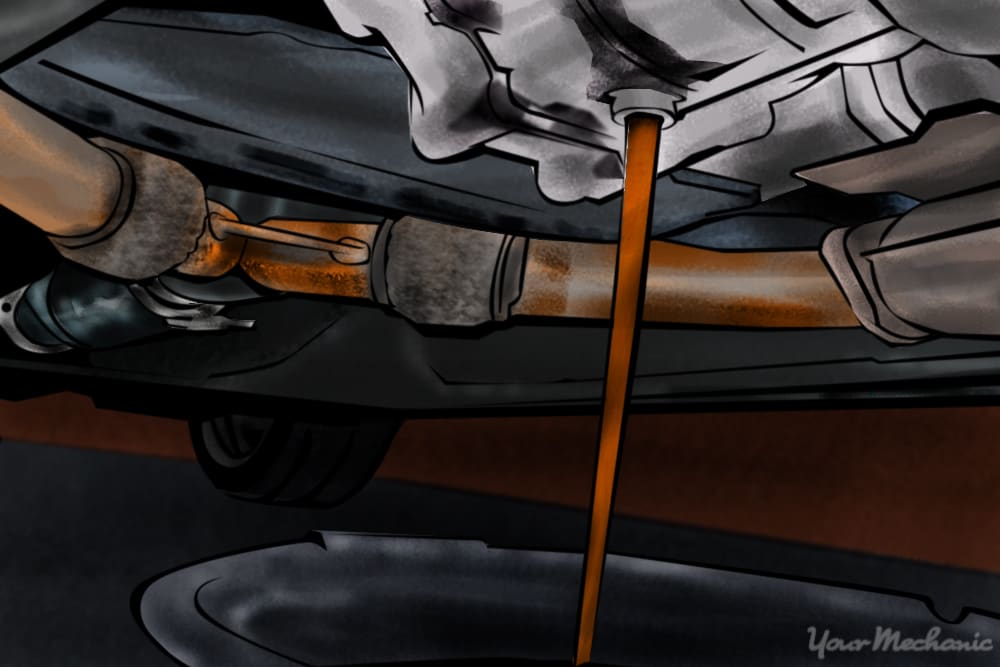

Transmission fluid is a lubricating liquid designed to keep components in the transmission moving properly and temperatures within cool. When it gets dirty, it may change from its original red or green coloring to brown or black. The fluid discoloration signifies you need to change your transmission fluid and filter, though this also depends on whether you have an automatic or manual transmission, car type, and how you drive. Service manuals will also include specified intervals of when you should change your transmission fluid — usually every 30,000 miles. Manual transmission fluids wear out quicker, though driving often in heavy traffic and towing heavy loads can also shorten the long-lasting effect of your transmission fluid.
In addition to suggested maintenance requirements and discoloration, signs that your transmission fluid may need changing include:
- Puddling under your car.
- Delays or issues with shifting gears — more noticeable in manual cars.
- High transmission temperature warning light turning on.
- Slight burning smell — most automatic transmission fluids have a sweet odor instead.
3 Types of Transmission Fluid
There are 3 different types of transmission fluid. They differ in general materials and intended purpose, and each car has a specified fluid it is compatible with. All of them contain chemicals harmful to humans, animals, and the environment if not disposed of correctly. The 3 main ones are:
1. Automatic Transmission Fluid: Designed for car’s with automatic transmission and some newer manual cars, automatic transmission fluid helps with lubricating gears, brake band friction, and valve operation. It is made from reshaped hydrocarbons in crude oil and catered toward specific cars.
2. Manual Transmission Fluid: Manual transmission fluid is typically made from a variety of different oils, such as regular motor oil, even heavier hypoid gear oil, and other heavy metals like lead. It is exclusively used in manual cars.
3. Synthetic Transmission Fluid: Synthetic transmission fluid is made from pressurized and temperature-regulated chemical reactions to make the ideal fluid. It’s built to oxidize less and not break down or thin out in high temperatures. Different car manufacturers may recommend synthetic fluid over traditional depending on each model’s needs.
4 Steps to Dispose of Transmission Fluid
Regardless of the type of transmission fluid you have, when it comes time to change it, you will need to dispose of old fluid to do so. Like many automotive fluids, transmission fluid contains components that can be harmful if ingested and detrimental to the environment, such as toxic heavy metals and lead. It requires intentional disposal methods to protect your health and ecosystems. Luckily, transmission fluid is recyclable, so getting rid of old fluid has benefits beyond improving car function. Follow these 4 steps for proper disposal of transmission fluid:
1. Collect old fluid from transmission flush. Make sure the drain pan you use is large enough to handle up to 3-gallons worth of liquid.
2. Pour fluid from the drain pan into a leak-proof container. Use a funnel to avoid spiliing. A sealed plastic bottle or a milk jug will often do the trick. Make sure the container is clean of any other liquids or oils, as most collection facilities will not accept mixed fluids, and that the lid seals tight. Store it in a safe place away from children or pets.
3. Find a local automotive fluid collection site. Some local waste facilities will accept your used transmission fluid along with other automotive fluids. Check your local government offices to find a household hazardous-waste accepting location near you. Or, see if your local auto parts store will take the fluid from you — most will do so for free because they can make money off what they sell to recycling centers.
4. Drop off old transmission fluid for disposal. There are few waste management groups that will come and pick up old transmission fluid, so you will most likely need to take it in yourself. For safe conveyance, double-check the seal on your storage container to make sure it won’t spill in your car or whatever mode of transportation you use.
Old transmission fluid should never be dumped down the drain, in the grass, on the sidewalk, or mixed with any other type of oil. It can harm animals or people who come into contact with it, as well as potentially contaminate water supplies. When taken to a treatment facility, the old fluid can be cleaned and repurposed for reuse. Be smart about disposing of all automotive fluids, and know that all automatic, manual, and synthetic transmission fluids require intentional disposal.



